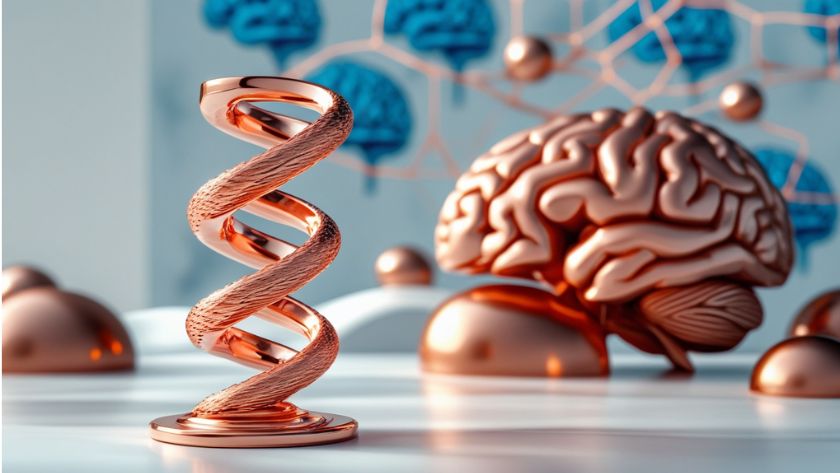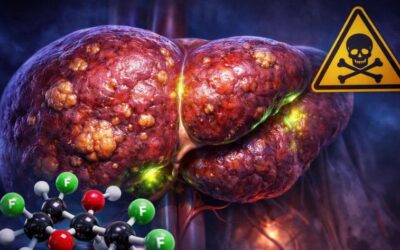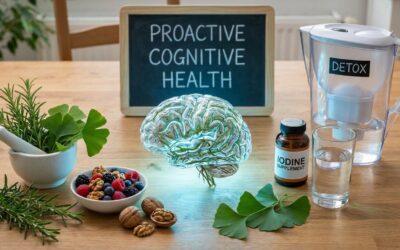When you think about nutrients critical for brain health, copper might not be the first to come to mind. We tend to hear a lot about omega-3s, magnesium, or B vitamins, but copper—yes, the same element used in pennies and wiring—plays a surprisingly crucial role in keeping our brains functioning at their best.
Here’s the kicker: copper’s relationship with brain health is a double-edged sword. While we need it for essential processes, too much or too little can contribute to devastating conditions like Alzheimer’s and Parkinson’s diseases.
Why Copper Matters for Your Brain
Copper is a trace mineral, meaning our body only needs it in small amounts, but its role is anything but minor. In the brain, copper is indispensable for several key processes:
- Energy Production: Copper is a cofactor for enzymes that help our cells produce ATP, the molecule that fuels every activity in the body. Your brain, which demands a constant supply of energy, relies heavily on this function.
- Neurotransmitter Synthesis: Copper is vital for creating neurotransmitters like dopamine, which affect mood, motivation, and motor control.
- Antioxidant Defense: Copper helps enzymes like superoxide dismutase neutralize harmful molecules called reactive oxygen species (ROS), which can damage brain cells.
- Neuronal Connectivity: Copper plays a role in forming myelin, the protective sheath around nerve fibers that ensures smooth communication between neurons.
In short, copper is like the behind-the-scenes crew that keeps your brain’s systems running smoothly.
Copper and Iron: The Two Double-Edged Swords
Here’s where things get tricky: copper is highly reactive. While it’s essential for brain health, its redox properties (the ability to gain and lose electrons) can also make it dangerous. If copper levels get too high, it can lead to the overproduction of ROS, causing oxidative stress and cellular damage. On the flip side, if copper levels are too low, critical enzymes can’t function, leaving your brain vulnerable to dysfunction.
This delicate balance is what makes copper so fascinating—and challenging—in the context of brain health.
This same balance goes for iron; too little or too much can also affect brain health.
Research has linked high levels of iron in the brain to neurodegenerative diseases like Alzheimer’s and dementia, which is both alarming and eye-opening. Iron is a powerful oxidizing agent. When unregulated, it can harm neurons, glial cells, and myelin—the structures that keep the brain working properly. While the brain tries to store excess iron safely in ferritin complexes, this storage system has limits. To perform its functions, iron must be released from these complexes, which can create risks if not carefully controlled.
Over a three-year period, the researchers found that older adults experienced significant iron accumulation in brain regions responsible for memory and problem-solving. This buildup was strongly associated with declines in episodic memory—our ability to recall past events—and executive function, which involves attention and decision-making.
Copper is like the key that unlocks the door for iron to get where it needs to go.
Without enough copper, things can quickly go off track—iron can pile up in places it shouldn’t, potentially causing harm, while vital areas like the brain are left without the iron they need to function properly.
Copper and Neurodegenerative Diseases
Recent studies have shed light on copper’s role in major neurodegenerative diseases, and the findings are both eye-opening and hopeful.
Alzheimer’s Disease
In Alzheimer’s, one of the defining features is the buildup of amyloid-beta plaques in the brain. These sticky protein clumps disrupt neuron communication and trigger inflammation. Here’s where copper comes in:
- Excess copper has been shown to bind with amyloid-beta, accelerating its aggregation into plaques.
- Elevated levels of unbound or “free” copper have been observed in Alzheimer’s patients, suggesting that copper imbalance could be a driving force behind the disease’s progression.
On the bright side, this understanding has led to new therapeutic approaches, like copper chelators—compounds that bind to excess copper and remove it from the body. Early research shows promise in slowing plaque formation and reducing oxidative damage.
Parkinson’s Disease
In Parkinson’s, the loss of dopamine-producing neurons in the substantia nigra is a key feature. Copper plays a role here as well:
- Low copper levels in this region have been linked to increased oxidative stress, which damages neurons.
- Copper’s interaction with alpha-synuclein, a protein that aggregates in Parkinson’s, can either stabilize the protein or, when imbalanced, contribute to its toxic clumping.
Therapies aimed at restoring copper levels in the substantia nigra could provide a much-needed breakthrough for managing Parkinson’s progression.
Other Conditions
Copper imbalances have also been implicated in Huntington’s disease, prion diseases, and even some forms of epilepsy. Each of these conditions highlights the importance of copper’s role in maintaining brain health and preventing damage.
Factors Contributing to Copper Depletion
Copper depletion in the body has become increasingly prevalent due to several modern factors that disrupt nutrient balance. Malabsorption, processed foods, excessive zinc supplementation, and the spike protein each play a role in depleting the body’s copper reserves:
- Malabsorption:
- Gut issues such as leaky gut, inflammation, and dysbiosis impair the absorption of essential nutrients like copper.
- Even copper-rich diets may fail to provide adequate levels if the digestive system isn’t functioning efficiently.
- Poor copper absorption affects energy production, immune function, and brain health, leading to deficiencies.
- Processed Foods:
- Processed foods are often stripped of natural copper and loaded with additives, preservatives, and chemicals that interfere with nutrient absorption.
- Regular consumption of these foods disrupts the body’s ability to maintain copper levels, even in otherwise healthy diets.
- The long-term impact of processed foods can lead to chronic copper depletion.
- Excessive Zinc Supplementation:
- Zinc and copper share absorption pathways, meaning that excessive zinc intake can interfere with copper absorption.
- High levels of zinc, whether from supplements or diet, can create an imbalance, leading to a depletion of copper stores over time.
- This imbalance affects key processes like red blood cell production, immune support, and collagen synthesis.
- The Spike Protein:
- The spike protein, whether from infection or exposure, causes systemic inflammation, disrupting metabolic processes and increasing the body’s demand for copper.
- This heightened demand, coupled with disrupted nutrient absorption, accelerates copper depletion.
- Prolonged exposure or repeated immune stress from the spike protein further drains copper reserves, impacting overall health and recovery.
Together, these factors create a perfect storm for copper depletion, often leading to symptoms such as fatigue, weakened immunity, cognitive issues, and poor metabolic health. Addressing these challenges with balanced nutrition, mindful supplementation, and gut health support is essential for restoring and maintaining optimal copper levels.
Symptoms of Copper Deficiency
One of the tricky things about copper deficiency is that its symptoms often mimic other conditions, like anemia, so they can go unnoticed. Here are some telltale signs to keep on your radar:
- Anemia: Fatigue and weakness from low red blood cell production.
- Bone Issues: Problems like osteoporosis or other abnormalities due to impaired bone health.
- Neuropathy: Nerve damage leading to tingling, numbness, or pain in the hands and feet.
- Low White Blood Cell Count: A reduced number of neutrophils, which weakens your immune system.
- Weakened Immunity: More frequent illnesses or slower healing times.
- Slowed Growth: Especially concerning for children and adolescents.
- Premature Graying of Hair: A potential sign of melanin production issues.
- Pale Skin: Linked to lower red blood cell levels.
The Incredible Benefits of Copper
Copper isn’t just about preventing deficiency and brain health—it’s a multitasking mineral that supports almost every system in your body. Here’s why adding copper to your daily routine (or ensuring you’re getting enough through food) is such a good idea:
- Enhances Iron and Sugar Absorption
Copper is essential for helping your body absorb iron and metabolize sugar, ensuring that you have the energy to power through your day. Without enough copper, your body can’t produce red blood cells efficiently, leading to fatigue and other symptoms of anemia.
2. Boosts Immunity
Copper plays a dual role in immunity: it prevents anemia and acts as an antioxidant to reduce oxidative stress. This combination helps your body fight off infections and recover faster from illness.
3. Supports Diabetes Management
Research suggests copper helps protect your cells from free radicals, which can contribute to type 2 diabetes. Maintaining healthy copper levels may reduce tissue damage and lower your risk of developing the condition.
4. Aids Fetal Growth and Development
Copper is crucial during pregnancy for the proper development of the baby’s skeletal, nervous, and cardiovascular systems. It can also help prevent birth defects and premature births, making it an essential nutrient for expecting mothers.
5. Improves Hair and Eye Pigmentation
Want to delay those grays? Copper supports melanin production, the pigment responsible for your hair, skin, and eye color. It can help keep your hair vibrant and your eye color-rich as you age.
6. Boosts Brain Function
Often referred to as “brain food,” copper supports cognitive function by maintaining healthy neural pathways and energy production in the brain. It’s even linked to enhanced creativity and sharper thinking.
7. Increases Energy Levels
By aiding in red blood cell production and iron absorption, copper ensures that your body has the energy it needs to function optimally, helping you feel more vibrant and alert.
8. Supports Connective Tissues
Copper is a critical player in the production of collagen and elastin, two proteins that keep your skin firm and your connective tissues strong. This means fewer wrinkles and less sagging over time!
9. Enhances Enzymatic Reactions
Copper helps regulate essential enzymatic processes that balance your metabolism and hormones. Think of it as a fine-tuner for your body’s internal systems.
10. Promotes Cardiovascular Health
Copper supports your heart and blood vessels by maintaining their structural integrity. It also plays a role in lowering bad cholesterol (LDL) and raising good cholesterol (HDL), reducing the risk of heart attacks, strokes, and atherosclerosis.
11. Supports Thyroid Function
Copper teams up with zinc and selenium to regulate thyroid hormones, ensuring your metabolism stays balanced and your body functions smoothly.
12. Improves Skin Health
Collagen and elastin production, both dependent on copper, are essential for maintaining youthful, firm skin. Copper keeps your skin looking radiant and helps prevent sagging over time.
What Does This Mean for You?
Learning about copper’s role in the brain might leave you wondering: am I getting too much or too little? The good news is you can supplement easily with copper if you aren’t getting it through your diet. Foods rich in copper include:
- Shellfish (like oysters and crab)
- Nuts and seeds (especially cashews, almonds, and sunflower seeds)
- Leafy greens (like spinach and kale)
- Organ meats (like liver)
- Dark chocolate (yes, really!)
That said, most people don’t eat enough liver or shellfish to get enough copper, and the leafy greens, nuts and seeds, and dark chocolate have substances in them like oxalates, sulfur or lectins that inhibit nutrient absorption.
Striking the Right Balance
Copper is essential, but like all nutrients, balance is key. Too little copper can lead to health issues like anemia and weakened immunity, while too much can cause toxicity, leading to symptoms like nausea, liver damage, or neurological problems.
Most people are copper deficient due to the fact that processed foods and the Spike Protein independently accelerate copper depletion out of the body. Add to that, most people don’t eat foods high in copper including organ meats and shellfish. Foods like nuts, seeds, and leafy greens do have copper but also have anti-nutrients that inhibit mineral absorption.
Accelerated Scalar Copper®: The Top Copper Supplement
Let’s talk about supporting your body with copper. When you’re looking to address a copper deficiency, it’s so important to choose a supplement your body can use. That’s where Accelerated Scalar Copper® truly shines.
Imagine most copper supplements – they only offer about a 5% absorption rate. That means most of the copper just passes through your system without being utilized. Accelerated Scalar Copper®, on the other hand, boasts an incredible nearly 99% absorption rate! This means your body can benefit from almost all the copper you’re taking.
What makes it so special? It’s all in the advanced formula. We use a proprietary nano scalar copper, which is incredibly tiny, and they treat it with a fascinating process called water implosion technology. This essentially energizes and structures the copper, making it more readily available for your body to absorb. Then, they enhance it further with scalar frequencies, which are believed to have additional health benefits.
But it’s not just about absorption; it’s also about purity and safety. Accelerated Scalar Copper® is made with the utmost care. They use ozonated and UV-sterilized distilled water and ultra-fine, 99.99% pure scalar copper. This careful process helps eliminate the risk of any toxic buildup that can sometimes occur with supplements containing larger copper particles. It’s like giving your body the purest, cleanest form of copper possible.
The innovative water implosion process doesn’t just improve absorption; it also energizes and structures the copper hydrosol, making it even more bioavailable. And the scalar frequencies? They’re thought to provide rejuvenating benefits for both your brain and body, adding another layer of wellness support.
So, when you’re looking for a copper supplement that your body can truly utilize, one that’s pure, safe, and offers added health benefits, Accelerated Scalar Copper® truly stands out. It’s designed to be the most effective and bioavailable copper supplement available today, offering you a gentle and effective way to support your health.
My Takeaway
So, what’s the takeaway from all of this? For me, it’s a renewed appreciation for the intricate dance of nutrients within our bodies, especially when it comes to brain health. Copper, often overlooked, plays a starring role in keeping our minds sharp and our bodies functioning optimally. It’s not just about avoiding deficiency; it’s about maintaining a delicate balance. We’ve explored how copper impacts everything from energy production and neurotransmitter function to protecting against the devastating effects of neurodegenerative diseases. We’ve also seen how modern life, with its processed foods, potential malabsorption issues, and the impact of the spike protein, can throw this balance off, making it more challenging than ever to get the copper we need.
It’s clear that simply eating copper-rich foods might not be enough, especially given the presence of anti-nutrients that can hinder absorption. This is where targeted supplementation, like Accelerated Scalar Copper®, can make a real difference. Knowing that there’s a product designed for near-perfect absorption, made with purity and safety in mind, gives me a sense of confidence in supporting my own copper levels. Ultimately, understanding the vital role of copper empowers us to take proactive steps toward safeguarding our brain health and overall well-being. It’s a reminder that even the smallest elements can have a profound impact on our lives, and paying attention to these details can make all the difference.
Sara Banta
Sara Banta is a Stanford University Graduate with a Degree in Economics and Psychology, and a certified Natural Supplement Expert & Graduate of the Institute for Integrative Nutrition. Sara is the Founder of Accelerated Health Products and host of the health & wellness podcast, Accelerated Health Radio.
- Sara Banta
- Sara Banta
- Sara Banta
- Sara Banta
- Sara Banta
- Sara Banta
- Sara Banta
- Sara Banta
- Sara Banta
- Sara Banta
- Sara Banta
- Sara Banta
- Sara Banta
- Sara Banta
- Sara Banta
- Sara Banta
- Sara Banta
- Sara Banta
- Sara Banta
- Sara Banta
- Sara Banta
- Sara Banta
- Sara Banta
- Sara Banta
- Sara Banta
- Sara Banta
- Sara Banta
- Sara Banta
- Sara Banta
- Sara Banta
- Sara Banta
- Sara Banta
- Sara Banta
- Sara Banta
- Sara Banta
- Sara Banta
- Sara Banta
- Sara Banta
- Sara Banta
- Sara Banta
- Sara Banta
- Sara Banta
- Sara Banta
- Sara Banta
- Sara Banta
- Sara Banta
- Sara Banta
- Sara Banta
- Sara Banta
- Sara Banta
- Sara Banta
- Sara Banta
- Sara Banta
- Sara Banta
- Sara Banta
- Sara Banta
- Sara Banta
- Sara Banta
- Sara Banta
- Sara Banta
- Sara Banta
- Sara Banta
- Sara Banta
- Sara Banta
- Sara Banta
- Sara Banta
- Sara Banta
- Sara Banta
- Sara Banta
- Sara Banta
- Sara Banta
- Sara Banta
- Sara Banta
- Sara Banta
- Sara Banta
- Sara Banta
- Sara Banta
- Sara Banta
- Sara Banta
- Sara Banta
- Sara Banta
- Sara Banta
- Sara Banta
- Sara Banta
- Sara Banta
- Sara Banta
- Sara Banta
- Sara Banta
- Sara Banta
- Sara Banta
- Sara Banta
- Sara Banta
- Sara Banta
- Sara Banta
- Sara Banta
- Sara Banta
- Sara Banta
- Sara Banta
- Sara Banta
- Sara Banta
- Sara Banta
- Sara Banta
- Sara Banta
- Sara Banta
- Sara Banta
- Sara Banta
- Sara Banta
- Sara Banta
- Sara Banta
- Sara Banta
- Sara Banta
- Sara Banta
- Sara Banta
- Sara Banta
- Sara Banta
- Sara Banta
- Sara Banta
- Sara Banta
- Sara Banta
- Sara Banta
- Sara Banta
- Sara Banta
- Sara Banta
- Sara Banta
- Sara Banta
- Sara Banta
- Sara Banta
- Sara Banta
- Sara Banta
- Sara Banta
- Sara Banta
- Sara Banta
- Sara Banta
- Sara Banta
- Sara Banta
- Sara Banta
- Sara Banta
- Sara Banta
- Sara Banta
- Sara Banta
- Sara Banta
- Sara Banta
- Sara Banta
- Sara Banta
- Sara Banta
- Sara Banta
- Sara Banta
- Sara Banta
- Sara Banta
- Sara Banta
- Sara Banta
- Sara Banta
- Sara Banta
- Sara Banta
- Sara Banta
- Sara Banta
- Sara Banta
- Sara Banta
- Sara Banta
- Sara Banta
- Sara Banta
- Sara Banta
- Sara Banta
- Sara Banta
- Sara Banta
- Sara Banta
- Sara Banta
- Sara Banta
- Sara Banta
- Sara Banta
- Sara Banta
- Sara Banta
- Sara Banta
- Sara Banta
- Sara Banta
- Sara Banta
- Sara Banta
- Sara Banta
- Sara Banta
- Sara Banta
- Sara Banta
- Sara Banta
- Sara Banta
- Sara Banta
- Sara Banta
- Sara Banta
- Sara Banta
- Sara Banta
- Sara Banta
- Sara Banta
- Sara Banta
- Sara Banta
- Sara Banta
- Sara Banta
- Sara Banta
- Sara Banta
- Sara Banta
- Sara Banta
- Sara Banta
- Sara Banta
- Sara Banta
- Sara Banta
- Sara Banta
- Sara Banta
- Sara Banta
- Sara Banta
- Sara Banta
- Sara Banta
- Sara Banta
- Sara Banta
- Sara Banta
- Sara Banta
- Sara Banta
- Sara Banta
- Sara Banta
- Sara Banta
- Sara Banta
- Sara Banta
- Sara Banta









